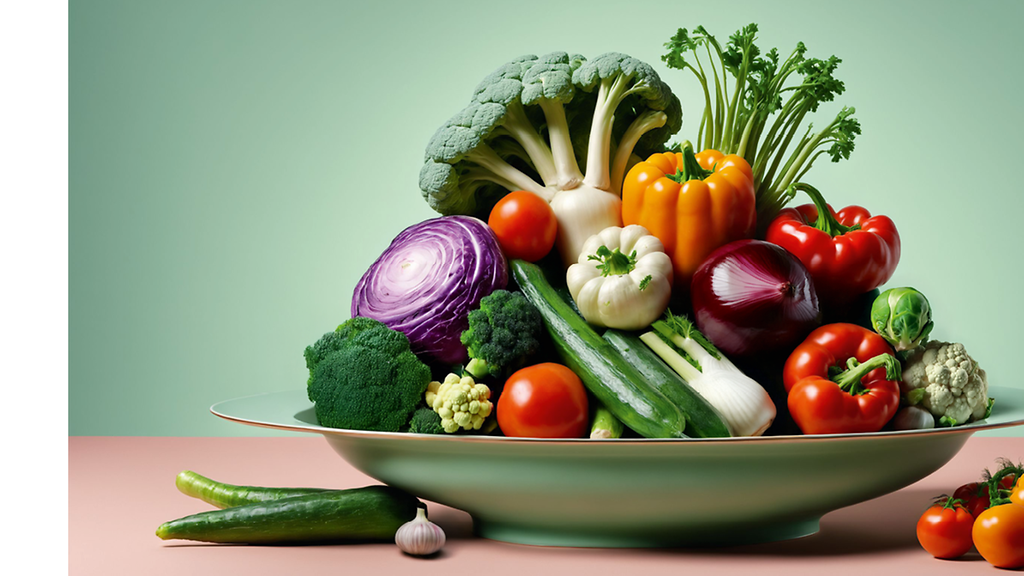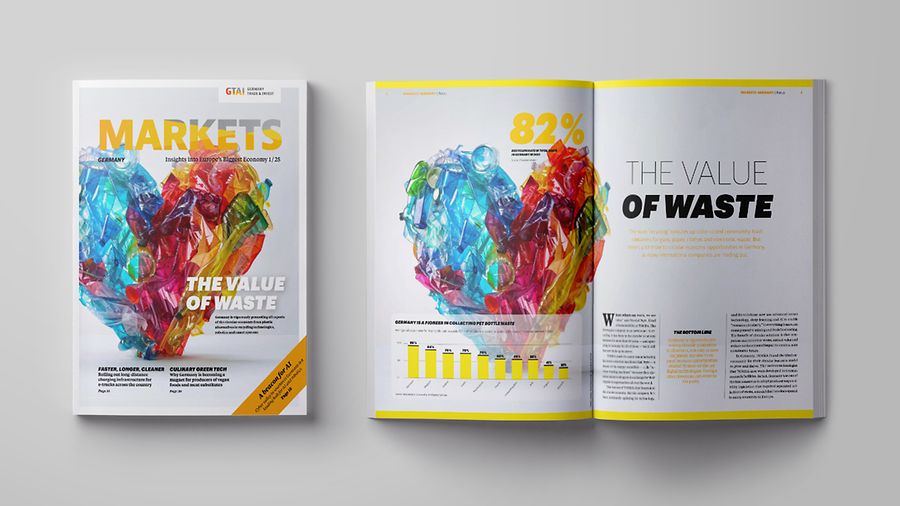
Markets Germany Magazine 1/25 | Food
GreenTech on a Plate
Germany is becoming the market du jour for the vegan food tech industry. Food technology expertise, especially in the country’s south and northeast, and a consumer base eager to experiment offer great chances for success.
Apr 28, 2025
Germany might be known around the world for Oktoberfest, but beer isn’t generally the main reason international companies come to Germany. And yet it was a deciding factor that tipped the scales for the Swiss company Planted Foods when it decided to set up a production site in a former brewery in Memmingen (see FDI Perspective box).
Planted Foods doesn’t brew suds. It produces meat alternatives from vegetable proteins. But there’s a logic to its choice of location. “We work with fermentation, and brewing beer is nothing other than a kind of fermentation,” explains Christoph Jenny, the company’s co-founder, explaining that the regulation of heat and cold plays a central role in beer brewing, as they do in the production of plant-based meat alternatives. “The property in Memmingen simply offered good technical conditions for our production right from the start.”
FDI Perspective: Planted Foods
Germany is the most important sales market for the Swiss food tech company Planted. It accounts for the largest share of the company’s exports, which make up 75 percent of total sales.
Banking on the growing demand for its plant-based meat products, the Swiss company is building a new additional production facility in Germany. The planned production volume is around 20 tons per day, which will support the creation of around 50 new jobs and doubles Planted Food’s current production volume The plant is being built on an old brewery site and will use modern fermentation technology to produce plant-based proteins. “Among other things, it was this property that tipped the scales in favor of the location,” says Planted co-founder Christoph Jenny. “Added to this are the ideal transport links, the proximity to the headquarters in Kemptthal and the many specialists from the food industry in Germany.”
With a hybrid sustainable energy supply, food production at the facility will be almost CO₂-neutral. Photovoltaics, well cooling and regional district heating will all contribute to the site’s energy system, which will be implemented with a German company that specializes in decentralized green energy infrastructures. According to Planted, the production of their recently launched “planted.steak” generates up to 97 percent less CO₂ and uses 81 percent less water than conventional beef.
The dedicated plant for plant-based foods is scheduled to go into ramp-up operation in the first quarter of 2025.
Planted Foods is one of many companies from the vegan food tech sector finding their way to Germany. One of the main attractions is the sheer size of the market with a target group that is open to plant-based nutrition. There is also a great openness to innovation in the food industry in Germany, says Jenny.
“There’s a lot of knowledge in Germany necessary for the plant-based food industry — whether it’s technical equipment or specialist expertise for its production.”
The trend toward flexibility
Vegan producers don’t have to look far to find consumers of its comestibles in Germany — and not exclusively in the cities either. “It’s not just foodies in Berlin, Cologne and Munich who buy plant-based food in Germany,” observes Jens Tuider, Chief Strategy Officer of ProVeg International.
Tuider lives in Angermünde, a small, fairly remote town in the northeast of Germany on the border with Poland. “Even here there is a broad selection of plant-based meats in supermarkets.”
The Bottom Line
For vegan food producers, Germany has the ingredients for success: food tech knowhow, plant protein cultivation, renewable energy and a captive consumer market.
Tuider heads up an NGO that is committed to transforming the global food system toward fewer animal products and more plant-based nutrition. Germany has the largest market in Europe for vegan alternative products in the retail sector, says Tuider, but it’s still growing healthily. According to figures from Belgium’s Good Foods Institute, total sales of plant-based foods in German retail amounted to EUR 2.2 billion in 2023 — an increase of around eight percent compared to 2022.
But Tuider doesn’t see his mission as all or nothing. According to a recent study by the German Ministry of Food and Agriculture, only two percent of respondents in Germany describe themselves as pure vegans, whereas eight percent have a vegetarian diet. The success of plant-based foods here is also down to the 41 percent who describe themselves as “flexitarians”: people who still eat meat and animal products but don’t do so all the time and are happy to mix their diet with plant-based alternatives.

This article was published in issue 1-2025 of the Markets Germany Magazine. Read more articles of this issue here
The power of protein
Germany is also attractive because of its stellar reputation for food technology research. “As a production location, Germany has a long tradition of biotechnology and food technology,” says Tuider. “It’s extremely helpful for innovative plant-based food manufacturers if they have a site in Germany.” For instance, plant-based food manufacturer Prolupin caused a sensation when it emerged as a spin-off of the Fraunhofer Institute for Process Engineering and Packaging. The company specialized in extracting protein from sweet lupins and making it usable as lupin protein isolate (LPI) for milk substitute foods. Prolupin launched its brand Luve in 2015 with a range of diary alternatives: yogurt, ice cream, milk and cream cheese. In 2023, Wide Open Agriculture (WOA), Australia’s leading manufacturer of plant-based proteins and a company listed on the Australian Securities Exchange, acquired Prolupin’s assets and patents and founded WOA Germany.
“We had been aware for years how much know-how about lupin protein isolates this German company had. When the opportunity presented itself in 2023, WOA seized it,” explains WOA Managing Director David Loichen, who is responsible for the company’s activities in Germany.
Lupin-based proteins were and are a very specialized field. Finding experts and production facilities is challenging, but WOA acquired both when it took over the Prolupin production site in Grimmen near Greifswald. WOA had already developed “Buntine Protein” in Australia, and the German arm provided a springboard for market entry in Europe.
“In Germany we have excellent conditions for actually commercializing the product and industrializing production,” explains Loichen. “In some cases, you need very special technologies and also technical support in the area of plant engineering. And this is a given in Germany because the major plant manufacturers and technical service providers in this field are also based here.”
3 Special features of the German food market
Going vegan, German-style
The global plant-based food market is poised for significant expansion, predicted to reach USD 113 billion by 2031, with strong growth in the Asia-Pacific region as well as in North America and Europe. Germany has by far the biggest established market for vegan food in Europe (sales of plant-based foods were EUR 2.2 billion in 2023), and the fastest-¬growing one. Investors planning to benefit from this growth trend should be aware of some special features of the German food market:
1
Modernization of the food and beverage industry: German companies operating in the food industry tend to be highly innovative and are investing big in plant-based products.
2
Increased consumer awareness of the benefits of plant-based diets: Meat consumption in Germany fell for the fifth time in a row in 2023, reaching a new low. Meat substitutes are most popular with one group in particular: female, under 50 and well-educated.
3
Competitive price range: One of the main factors hindering the growth of the plant-based market is the comparatively higher price range of meat substitutes. Consumers buy meat substitutes in supermarkets (84%), discount stores (52%), and organic food stores (21%). A low-priced range of substitute products has also become established at discount grocery stores, which is driving market growth and increasing the willingness to buy in this segment. Overall, price (58%) is a more important purchase criterion for consumers than the quality of the product (53%), and the fact that the item is a source of protein (48%).
Northeastern culinary delights
Prolupin — now WOA Germany — is located in the regional state of Mecklenburg Western-Pomerania in northeastern Germany, an area attracting more and more companies of the food tech sector. So it’s no wonder that a trade delegation trip there last year entitled “The future is plant-based” (organized by GTAI for US and Canadian companies) was a great success. Two Canadian entrepreneurs were so full of enthusiasm after the trip, they started a podcast about the opportunities for vegan food producers in Germany.
Mecklenburg Western-Pomerania has a long tradition of agriculture. “The agricultural sector is open to raw materials , such as lupins, that companies need to manufacture vegan products,” says Joy Koppatz from Invest in Mecklenburg-Vorpommern. Local suppliers in Germany can ensure compliance with all the strict nutrition and sustainability standards that label-conscious consumers expect, especially on the German market. “Regional cultivation, a small ecological footprint, short transport routes and renewable energies: none of this is a problem here because the agricultural sector has adapted to this and moved with the times,” explains Koppatz.
“The region also has a lot of expertise to offer in research and development in all stages of vegan food processing,” Koppatz continues. Food is one of the most important industries, representing about one-third of GDP, there, so the R&D ecosystem is well developed and supported. “We are working here today on the nutritional concepts of tomorrow — so investors and producers who work with us to turn ideas into products are very welcome.”